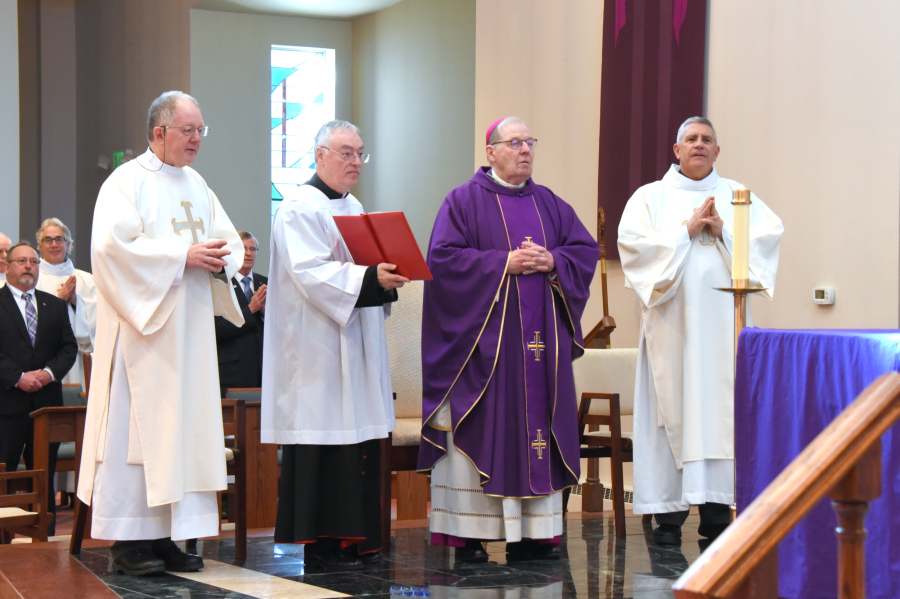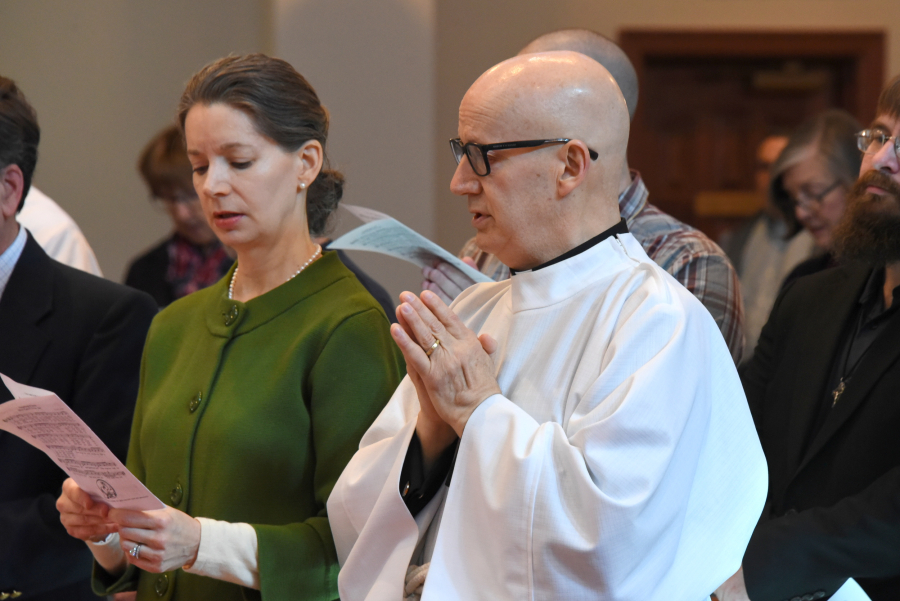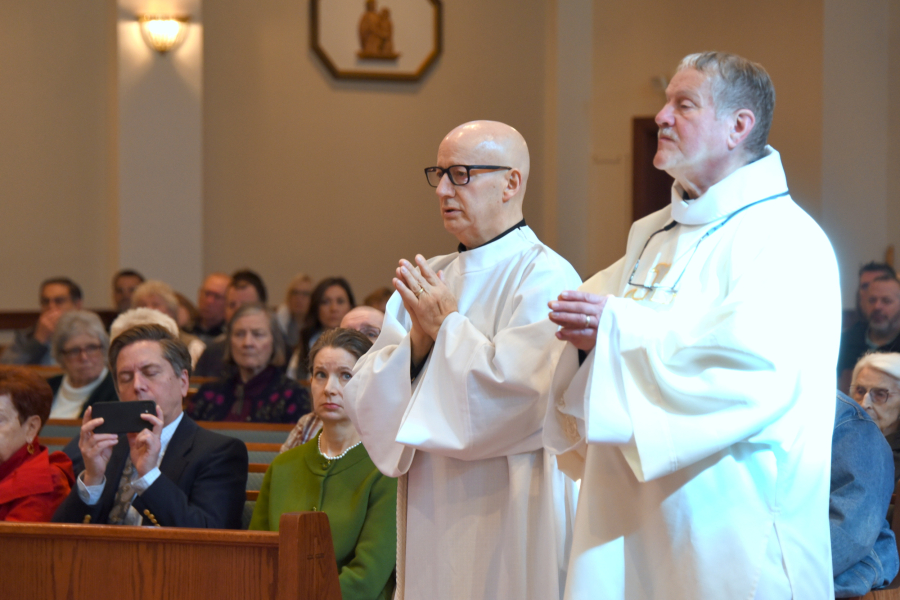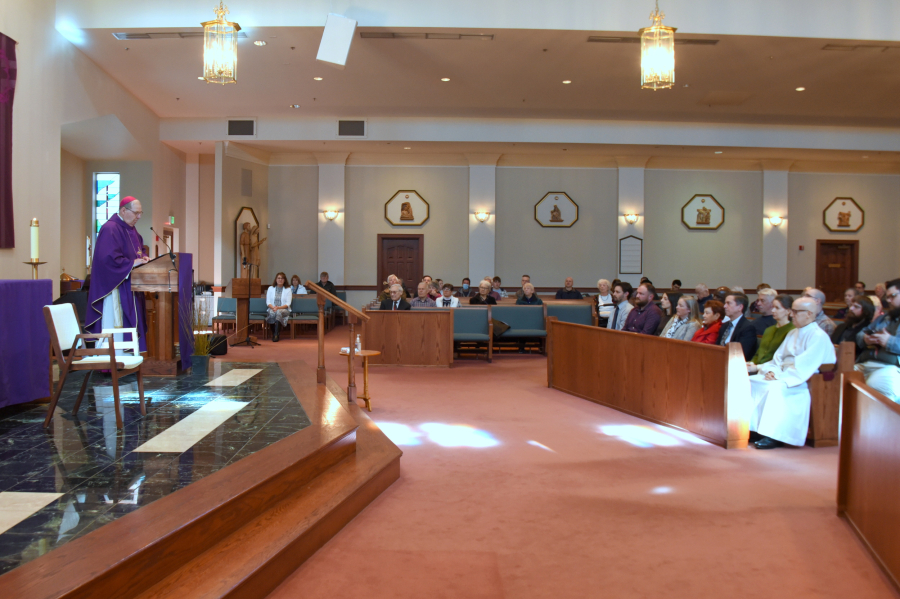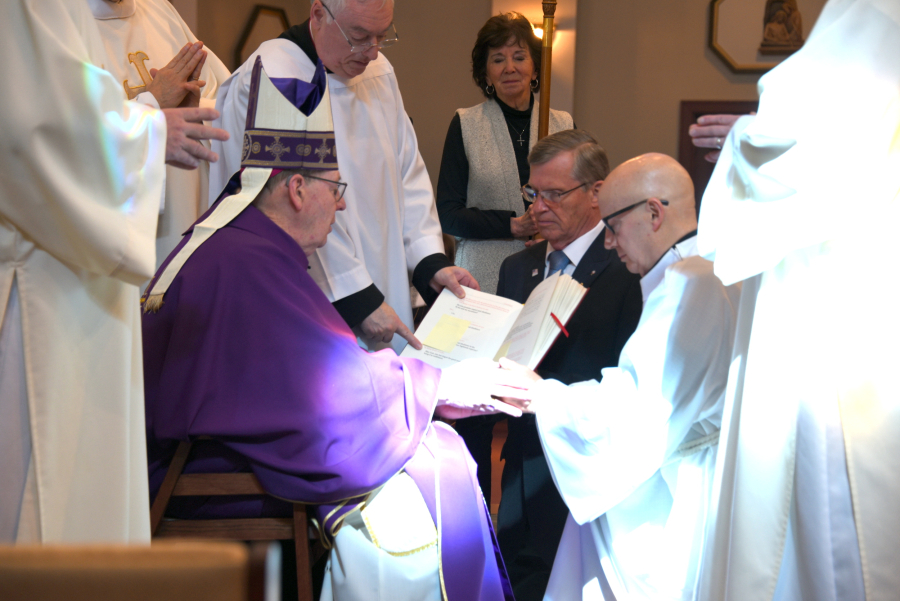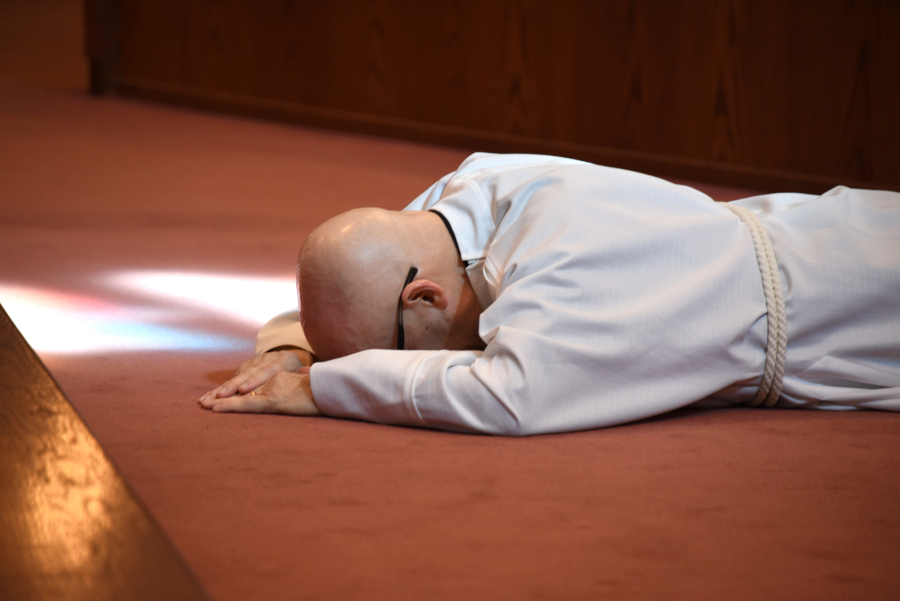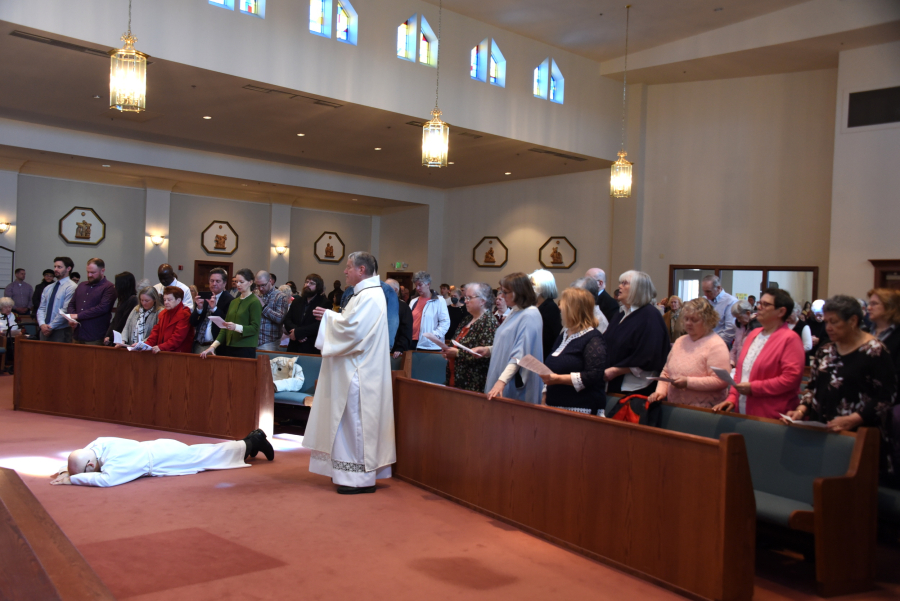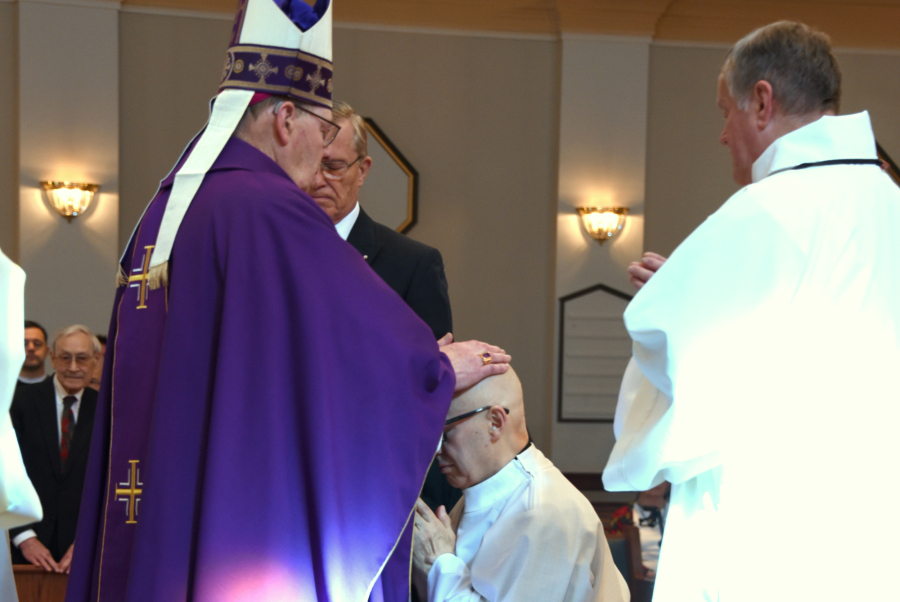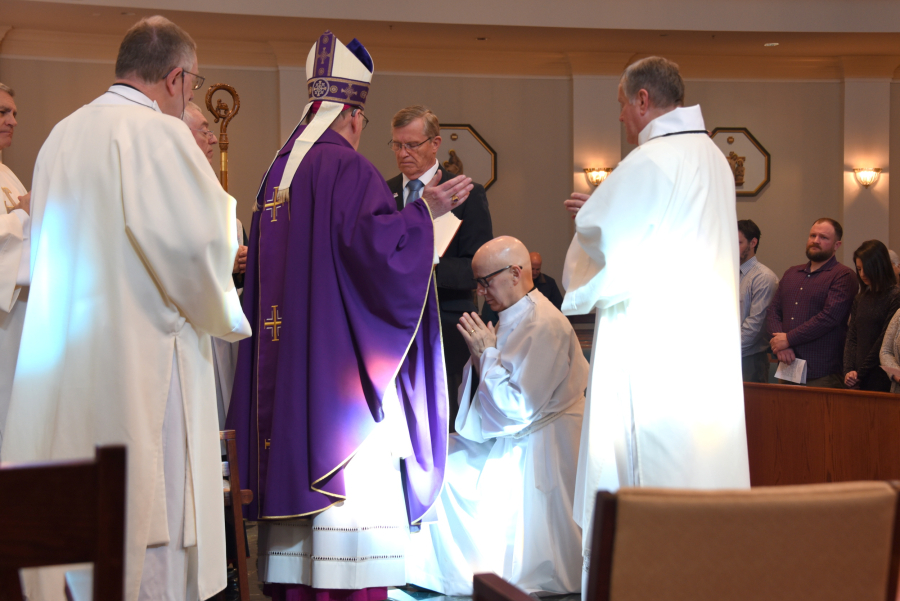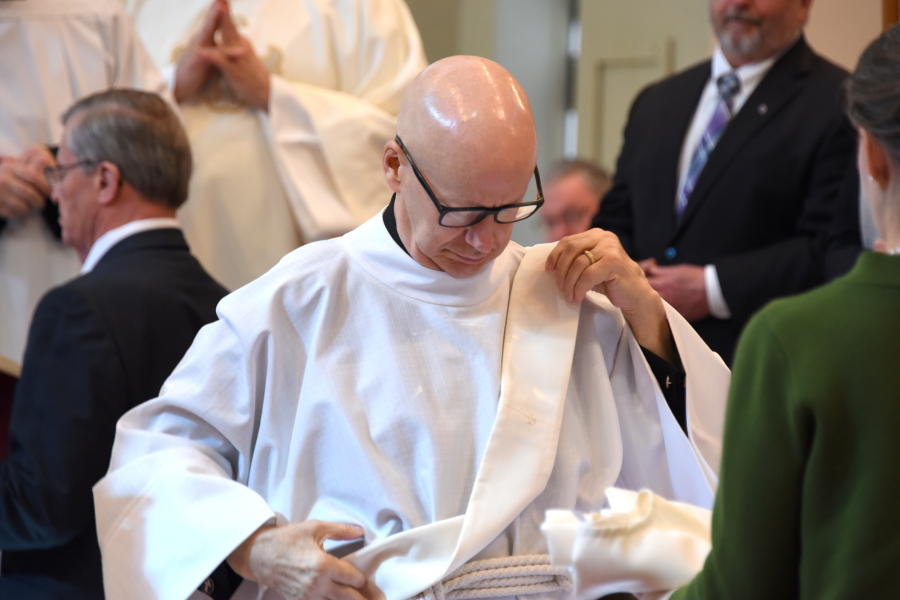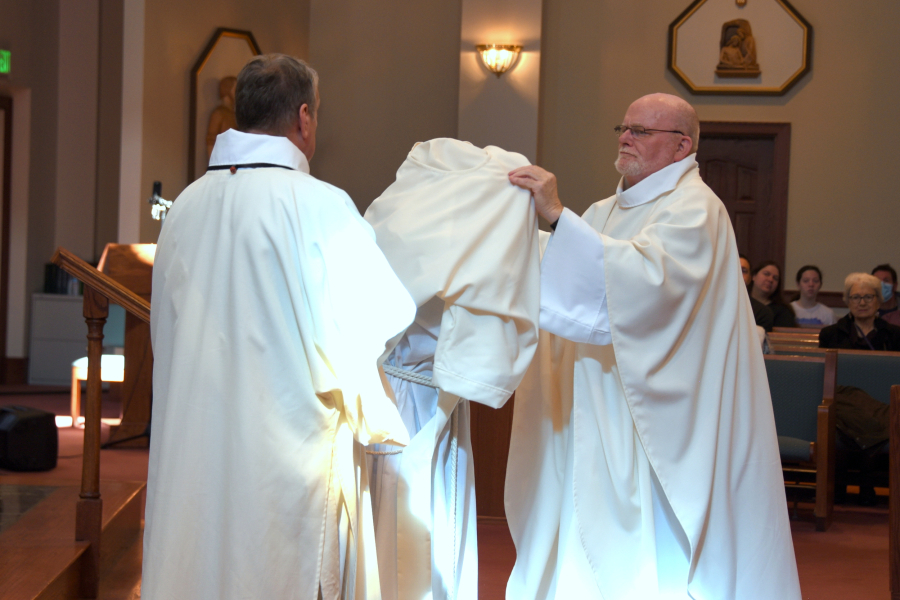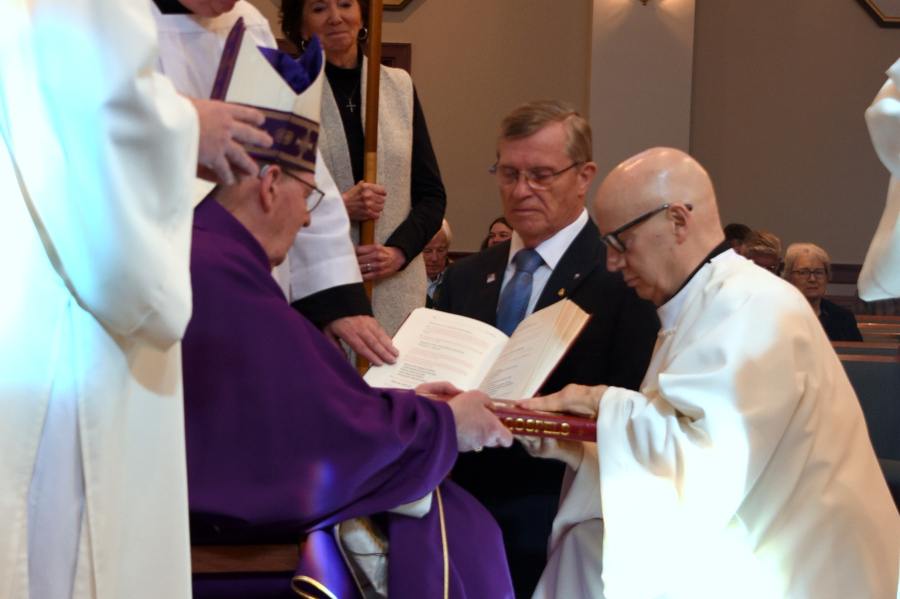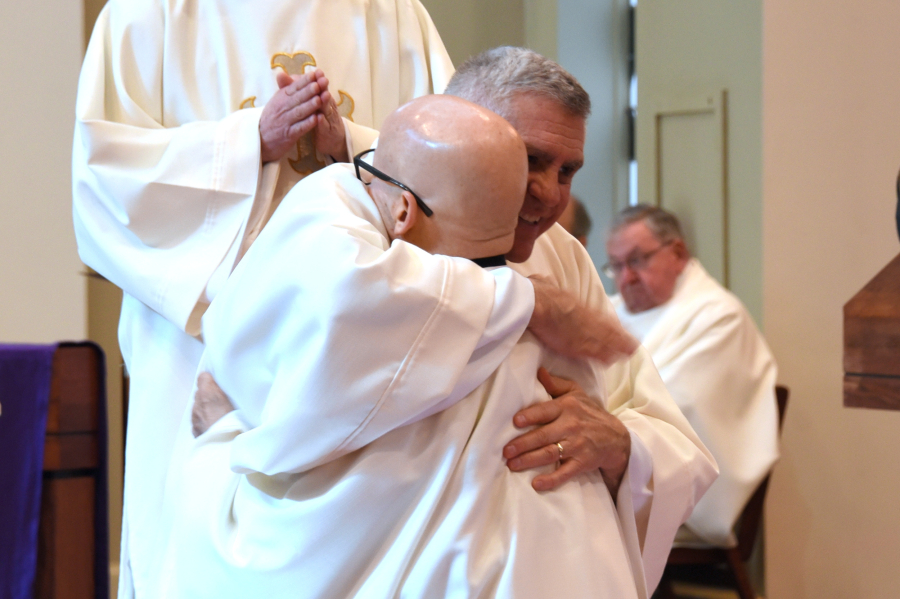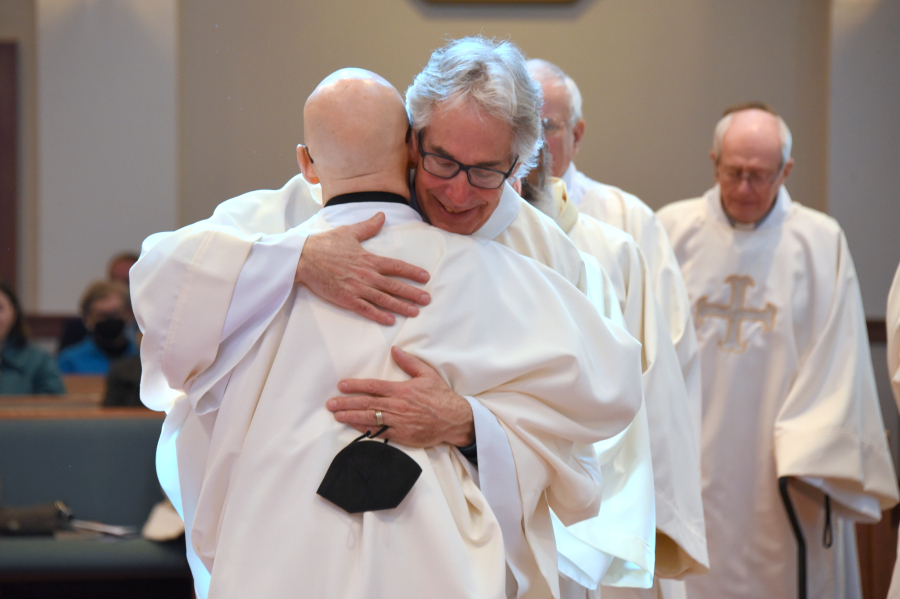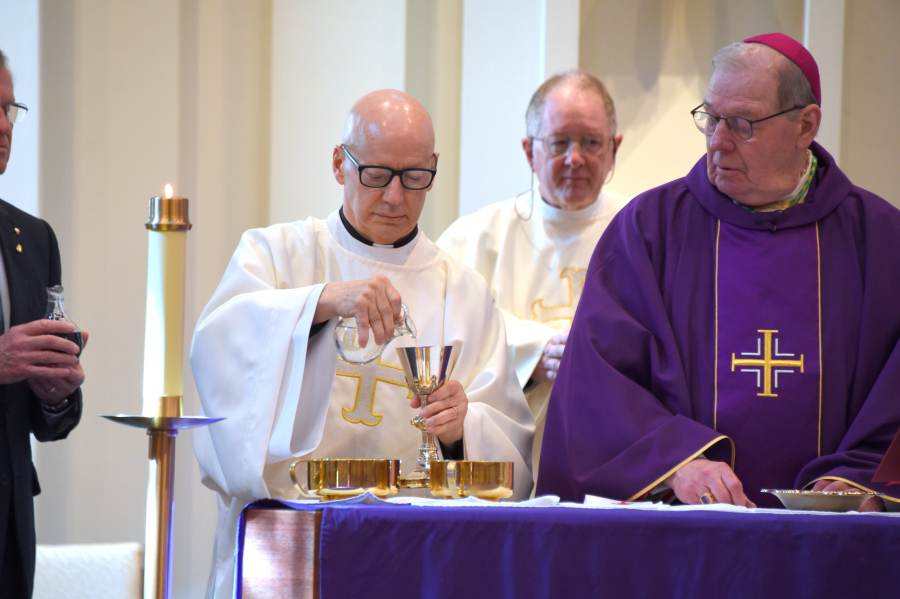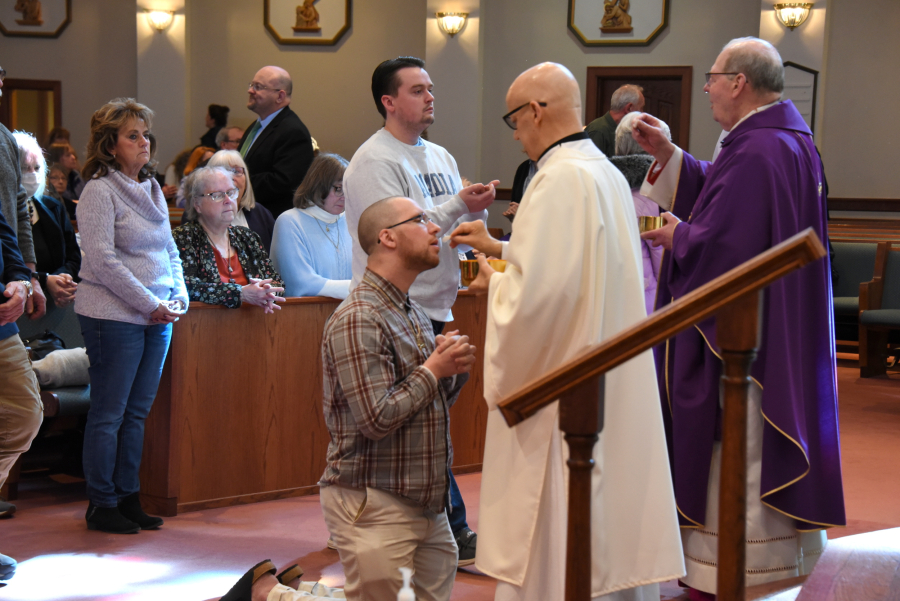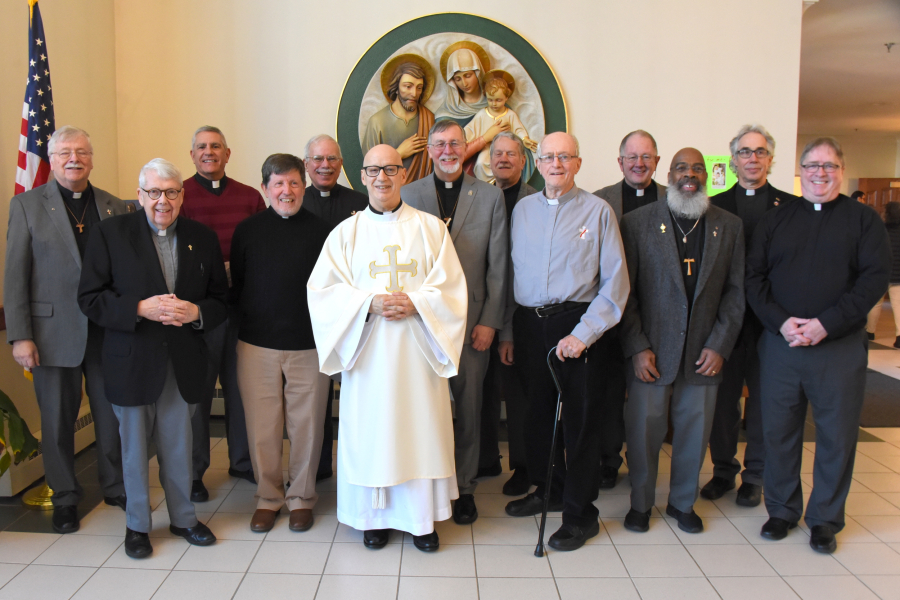Called to be a servant
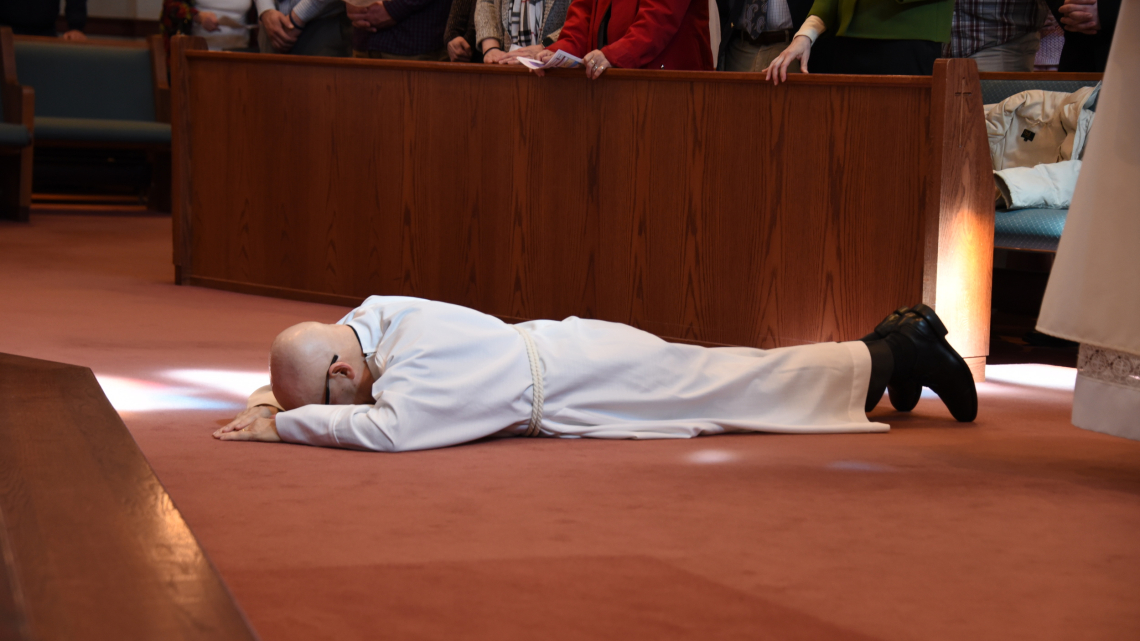
Since he was a young man in his 20s, Daniel Mahoney has dedicated his life to serving others, taking an active role in the churches where he worshiped and, most especially, reaching out to those battling substance-use disorders.
“I always see things and understand people who are on the fringe or the margins, so to help them has always been my goal,” he says.
It is that call to serve, along with his deep faith, that led Mahoney to respond to God’s call to the permanent diaconate. He was ordained at his home church of St. Martha in Kennebunk on Sunday, March 19, by Bishop Robert Deeley.
“You are called to be a servant. This is not something new for you. It has been a part of your Christian witness,” the bishop said in his homily. “You have exercised it in your work here in the parish. You have also exercised it in the work you do each day in the world as you help to heal and make whole those who have struggled with addiction. Today, however, your service takes on a sacramental character.”
During the ordination Mass, Mahoney stood before the bishop to make the promises of the elect, resolving to discharge the office of deacon with humble charity, to proclaim the faith in word and deed, to maintain and deepen a spirit of prayer, and to conform his way of life to the example of Christ.
Mahoney then lied prostrate while the Litany of Saints was sung, seeking Christ’s mercy and the intercessory prayers of the communion of saints.
“It was kind of neat because you don’t get distracted by anything so I could hear the Litany of the Saints,” he says. “At the end of the Prayer of the Litany of the Saints, four or five times, it mentions ‘this consecrated man.’ It’s like ‘Wow.’ It kind of blows you out of the water that I am now a consecrated man.”
After lying prostrate, Mahoney knelt before Bishop Deeley, who laid hands on him in silence and then prayed the Prayer of Consecration. He was then vested with the stole and dalmatic, symbols of the diaconate, by Father Fred Morse, pastor of Holy Spirit Parish, and Deacon Dennis Popadak, from the Parish of the Holy Eucharist, after which he knelt again before the bishop, who handed him the Book of the Gospels, counseling him to “Believe what you read, teach what you believe, and practice what you teach.”
The bishop then congratulated him with a fraternal kiss of peace, as did all 12 permanent deacons who attended the Mass, some traveling from as far away as Caribou, Greenville, and Rumford to be there.
“When we started in our grad school experience, Dan was just right in there, and he’s got a unique perspective with the Spirit, and we always appreciated that,” says Deacon Carl Gallagher, who went through formation with Mahoney. “Those guys we went to school with, we will always be really close friends.”
“I think he will be a wonderful sign of Christ at work in the Church,” says Deacon Frank Daggett. “He has a very joyful attitude of perseverance and patience in all the challenges that have come his way, and I think he carries that on in his ministry to those who are recovering from addiction.”
After the fraternal kiss of peace, Deacon Mahoney assisted during the Liturgy of the Eucharist, which he says was the most poignant part of the Mass for him.
“Being able to prepare the chalice for the bishop, to put the wine and the water in and to pray the prayer, ‘By the mystery of this water and wine, may we share in the divinity of Christ, as he humbled himself to share in our humanity’ — just the mystical, incredibleness of that. Then, after the consecration of the bread and the wine into the body and blood, to come down and administer the sacrament for the first time as a deacon to my family, that is really something I envisioned and waited for a long time,” he says.
The road to the permanent diaconate was a lengthy one for Deacon Mahoney. While formation in the Diocese of Portland typically lasts for about five years, Mahoney’s studies began 11 years ago with the class of deacons who were ordained in 2017. Mahoney had difficulty completing the coursework because he suffers from dyslexia.
“I started to try to learn the way everyone else learns, and that didn’t work for me,” he says. “I was really struggling. It was affecting me emotionally and spiritually, so I resigned in order to take care of myself.”
After a break, Deacon Mahoney recommitted himself to the academic studies, determined to complete them, even if it did not lead to ordination.
“The big obstacle wasn’t reading but writing. I couldn’t get the writing to come out. So, my goal was to return and to figure out the writing problem,” he says.
As he has at many points in his life, he turned to prayer. A friend recommended that he contemplate the Seven Sorrows of Mary. He also reflected upon the 11-step meditation of Alcoholics Anonymous (A.A.), seeking to understand God’s will for his life.
“I started to pray and ask Him, ‘If it is your will for me to write, then give me the power to carry it out,’” he says. “I started to pray that, and it was almost like the Holy Spirit said to me, ‘Do this as an act of worship.’”
Dedicating himself to that, he says within the next few weeks, he was able to write a half page.
“About two weeks later, an entire page came out. Then, the next month, a page a week came out, and by the six-month mark, I was able to probably write 10 pages a week,” he says.
With steadfastness and through perseverance, Mahoney earned his certificate in pastoral ministry from the Loyola Institute of Ministry in New Orleans, and he was then accepted back into formation by Bishop Deeley.
“He has a heart that believes all things and hopes all things, and so, two years ago, on April 30, 2021, he restored me to formation,” says Deacon Mahoney. “The rules say I have to promise obedience to him and his successors, but I tell you from the heart, it doesn’t have to be the rule. Out of love and gratitude, I’ll be doing that without question or pause for as long as I breathe.”
Deacon Mahoney says because the road was so long, he had doubts until the end whether he would be ordained.
“I didn’t really even have confidence that I was going to make it until the rehearsal on Thursday,” he says. “Then I realized, ‘I can do this.’”
He says he now feels blessed.
“I’m excited, and I’m glad to have the power and the fullness of the Spirit that comes with it all, but I also feel very humble to be committed to the discipline of daily prayer, and taking care of myself, and all of that, so I can truly give myself to the Church because that is what this is all about,” he says.
His wife, Lizanne, says it is what her husband has long been committed to doing.
“How to serve people and how to bring the faith to the community is what he lives and breathes and thinks about all the time,” she says.
While his formal preparation for the permanent diaconate began 11 years ago, Mahoney’s desire to serve the Church goes back to his childhood. He was born in Long Island, New York, the son of devout Irish Catholics, and says he was involved at his church from his early years.
Deacon Mahoney says he struggled in high school, and after graduation, he joined the U.S. Marines, looking for more discipline in his life. While stationed on Parris Island in South Carolina, he remembers seeking Mary’s intervention.
“I prayed, out of nowhere, this prayer. I said, ‘Mary, if you could help me make my mother as proud of me as your son made you proud of Him,’” he says. “And, in classic Mary fashion, she immediately pumped me full of an insatiable desire to know Jesus Christ.”
That desire, however, would take him to Protestant evangelicalism.
“It was just that I was searching the Scriptures, and the evangelicals were the ones who were searching the Scriptures, so that is where I ended up,” he says.
After the Marines, he attended college, where he did Christian outreach, an experience that led him to enter a Protestant seminary in Massachusetts, seeking to become an ordained minister. He had trouble, however, keeping up with the language studies. It was then that he was tested and learned he was dyslexic.
While he was disappointed that he was unable to complete his seminary work, he now sees it as part of God’s plan.
“After I returned to the Catholic Church, I was doing an Ignatian Life Examen, and it just showed me that it was the Lord giving me an education, teaching me about the separated brethren, and then, when I had enough, He brought me home,” he says.
The person who guided him home was Lizanne, a devout Catholic. Lizanne is a mental health and substance abuse counselor, and the couple met at a conference in Washington, D.C. It led to a long-distance relationship, with her living in Chicago, Illinois, and him in Maine, where he had moved in 1999. After they married, they settled in Maine and started attending Protestant services together, but that would soon change because Lizanne was craving the Eucharist.
“Although the pastor of the Protestant Church was a gifted speaker, I wasn’t getting what I needed,” she says. “A spiritual hunger is probably the way to describe it. My desire to spend more of my waking hours in the Spirit versus in the flesh, so to speak, was struggling.”
Recognizing the importance of worshiping together, Deacon Mahoney says he, too, went back to the Catholic Church. He says he also felt the Holy Spirit calling him home.
“The Holy Spirit was basically saying to me, ‘Go home and save your people.’ And I was like, ‘OK, who are my people?’ And it was obvious to me that it was the Catholic Church.”
Deacon Mahoney says he felt a pull to the permanent diaconate not long after returning to Catholicism. He had first learned about it while attending a Mass in Chicago when he and Lizanne were still dating.
“There was a bookshelf all the way across the back of the church, and at one end, it had pamphlets, and for some reason, the pamphlets were illuminated to me. So, I ended up going to the bookshelf at the end of the Mass, and I grabbed the first pamphlet in the rack, and it was a book on the permanent diaconate,” he says.
He received affirmation that he might be called to Holy Orders after going to reconciliation with Father Thomas Murphy, who was pastor of Holy Spirit Parish at the time.
“He said to me, ‘Dan Mahoney, I see Christ in you. You should consider the diaconate.’”
Mahoney began shadowing Deacon Darrell Blackwell.
“Service was the whole concept in my mind,” says Deacon Mahoney. “There are so many things to do in the Catholic Church.”
A permanent deacon’s ministry is threefold: the service of the liturgy, the word, and charity. Permanent deacons assist priests at the altar and may offer the sacraments of baptism and marriage. They preach the Gospel and teach the faith. And they are called to serve others, something to which Deacon Mahoney had already dedicated his life, most especially through his service to people in recovery.
It’s a ministry to which he was introduced while serving at a Protestant church decades ago. Then, while living in Massachusetts, he worked in a hospital emergency room, doing assessments. He found that most people coming in for treatment were struggling with addictions and discovered that he had an aptitude for assisting them. He says he also came to realize that one of the reasons he understood them so well was because he struggled with alcohol himself, a problem that went back to his adolescent years.
“I realized that I needed to get sober and started to go to A.A. and prayed that God would remove my obsession, and boom,” he says. “Through the work, I got sober myself, which was 30 years ago.”
Mahoney’s service to people with addictions has included 10 years with the Salvation Army, another 10 as the director of an opioid treatment program in Portland, and now as the owner of two recovery residences, one in South Portland and one in Westbrook.
Mahoney says he established the residences back in 2014, while in formation, because he thought it would give him more flexibility to do the course work.
“You would think that reading a book and writing a paper would be the easy thing and starting the houses would be the hard part, but for me, it’s just the opposite,” he says.
The two homes can serve 22 people at a time, and since they opened, Deacon Mahoney estimates they have helped about 150 men.
“They all have to do three or four A.A. or N.A. meetings a week, have a sponsor, work the steps through certain intervals, pay their rent, and do their rotating chore,” explains Deacon Mahoney.
The Westbrook residence includes Morning Star Recovery, a faith-based nonprofit dedicated to helping people recover from addiction by blending the 12 steps of Alcoholics Anonymous and Narcotics Anonymous with Catholic spirituality.
“We believe that if you really want to get clean and sober, the most dynamic, powerful way to do that is to integrate the 12 steps with the sacramental life of the Church,” Deacon Mahoney says.
“The secular world provides counseling and all these governmental assistance programs, but none of them has the ability or freedom to bring people to God, who is the source of healing, and peace, and contentment in our life,” says Dillion Brabants, who manages the program.
Some of the men who have been helped by Morning Star Recovery attended Mahoney’s ordination Mass in gratitude to him.
“I came here to celebrate Dan and this new chapter of his life because he was an instrumental part of the beginning stages of my journey to recovery and also to my conversion to Catholicism,” said Greg Mednis, who traveled from Dorchester, Massachusetts, where he now lives, to attend the Mass. “It has changed me profoundly.”
“Dan has been a big part of my life since I came to Morning Star about 10 months ago. I see him as a sort of spiritual father, as do I think the rest of the guys in the house at Morning Star Recovery,” says Alex Laccetti. “The community life that we experience, the life of prayer, are paramount to my personal recovery.”
“I was newly Catholic and relatively newly sober, and I thought I would want to serve people in the recovery community, but I wanted to do it in a Catholic way, and Dan’s house provided the opportunity to do that,” says Daniel Cornish.
Deacon Mahoney says having the men at the ordination Mass brought his two worlds closer together.
“It is connecting it all, making it all the same or all a part of the Church,” he says.
Deacon Mahoney says he sees his ordination as recognition by the Church of the work he is doing. He also hopes that through the graces he has received, he will be able to even more fully respond to the needs of the community.
“You bring a whole power and flow of the Spirit. I want to be able to do that for the people whom I serve,” he says.
Deacon Mahoney says he is grateful to all who supported him along his journey, first and foremost his wife, Lizanne.
“I will always be indebted to her for a million things,” he says.
Lizanne says she only did what he would have done for her.
“He is an example of how to support a spouse,” she says. “It didn’t take much effort on my part, being part of everything, because I absolutely loved it, so I wanted to be a part of it.”
Deacon Mahoney also expressed thanks to Father Morse and other clergy and to his parish community.
“As we celebrate today, it’s really not about me, it’s about you,” he told them at a reception following the ordination Mass. “I really owe you a debt I cannot repay.”
Members of the parish say they couldn’t be happier for him.
“He has worked very hard,” says Carolyn Houston, director of faith formation at Holy Spirit Parish. “He started out doing high-school faith formation with me at least 10 years ago, and he’s been a joy. I can’t wait to see what the Lord has in store for him now that he is a deacon.”







